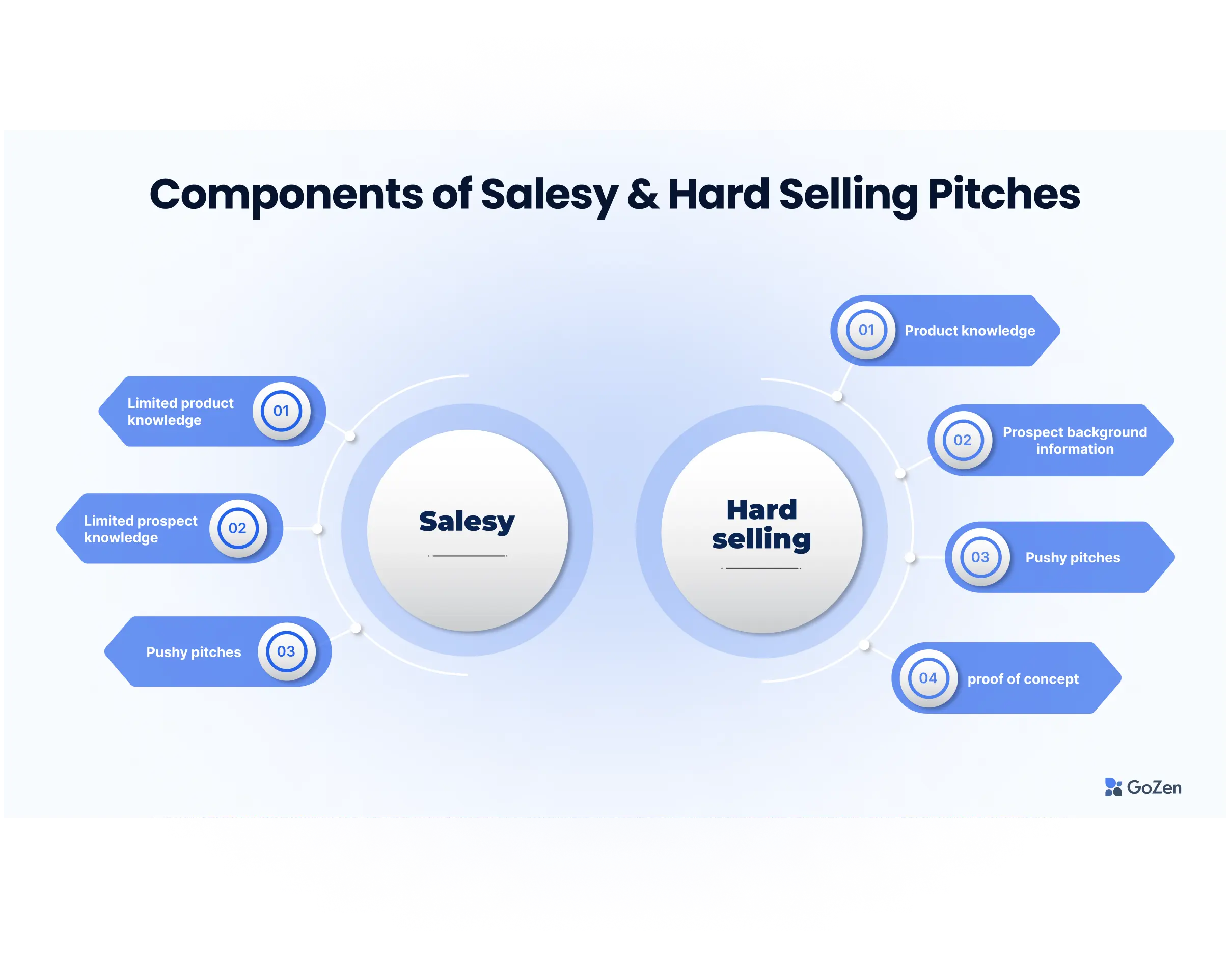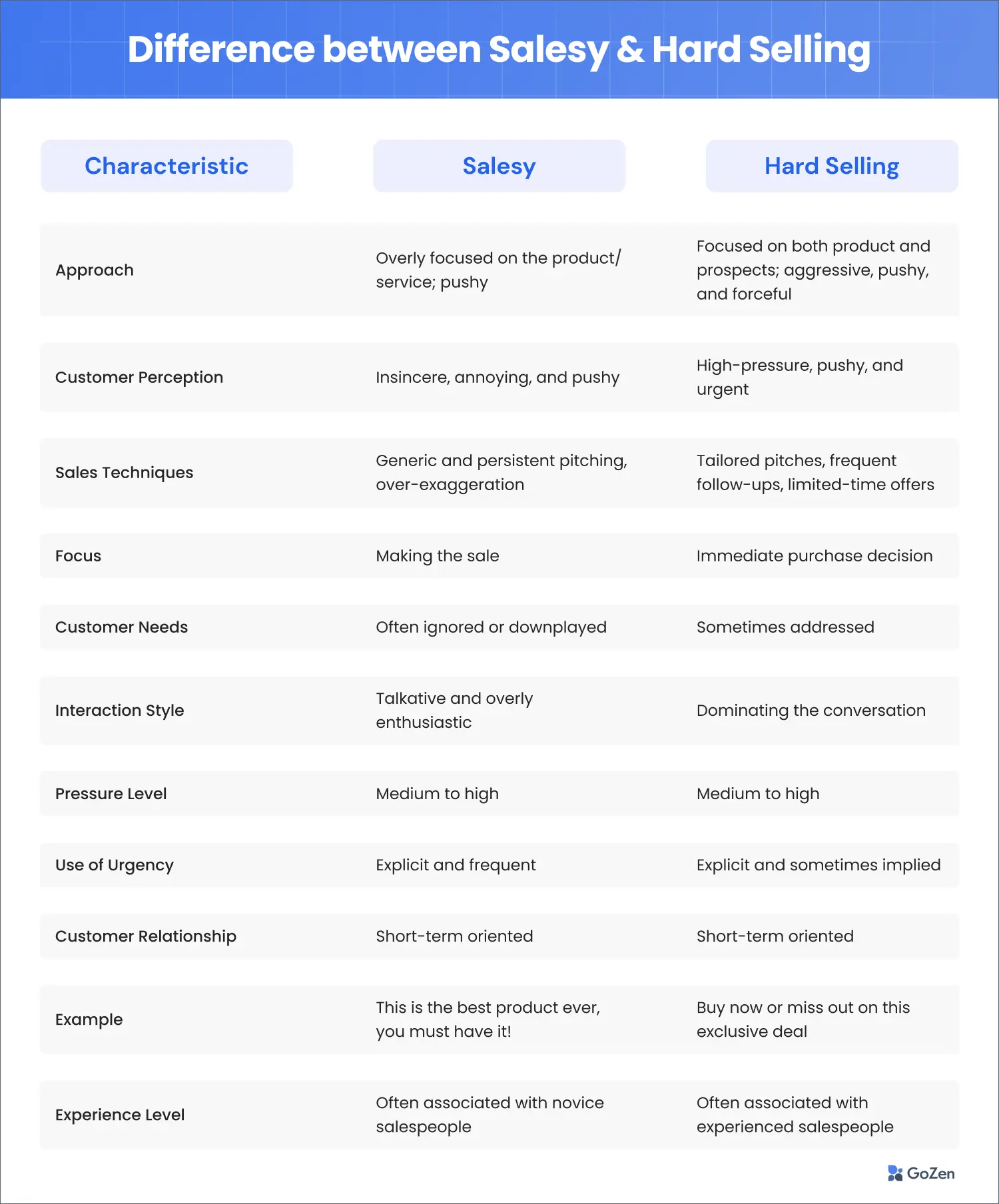Salesy
Last weekend, I hung out with one of my college mates, who is now an entrepreneur.
While we are having a casual conversation at Starbucks, his phone buzzes with a call from an unknown number.
Since the caller ID shows the call as sales, he put it on speaker.
Hello! I’m excited to tell you about an amazing offer we have today!”
The voice on the other end is overly enthusiastic, launching into a high-energy pitch about a product we’ve never heard of.
My friend tried to get a word in, but the salesperson barrels on, listing features and benefits without pause.
The more the salesperson talks, the more irritated we have become.
My friend ended the call, he seemed a bit frustrated.
Without dwelling on it, he continued our conversation from where we had left off.
The product might have been interesting, but the pushy approach ruined any chance of that. This scenario illustrates the core issue of sounding salesy.
It’s not just about selling a product; it’s about respecting your prospect’s time and needs. Let’s learn what being salesy means and how to avoid it.
Salesy Meaning
The term salesy refers to sales pitches that are pushy and aggressive in tone and superficial in nature.
Salesy pitches are more product-centric than customer-centric. When a salesperson is described as “salesy,” it often implies that they are more focused on making the sale than on understanding or addressing the customer’s needs.
Typically, salesy pitches take place when the salespeople have no or minimal information about the lead or prospect they are talking with.
Salesy vs Hard Selling
In the sales world, the terms “salesy” and “hard selling” are often used interchangeably, since salesy is a characteristic of hard selling.
But they refer to different approaches. Both aim for quick sales, yet their methods vary significantly.
“Salesy” describes creating a sense of emotional urgency, often coming across as insincere or pushy. This approach is typically used with cold leads, where personalizing cold scripts for a large volume of data is challenging. Consequently, salespeople often resort to salesy approach to close deals.
In contrast, “hard selling” involves aggressive, high-pressure tactics, such as lifetime deals, scarcity, and frequent follow-ups to close the deal swiftly.
This method is also primarily employed with cold leads. But, salespeople sometimes use it with warm leads as well to promote low-cost products.
While both salesy and hard selling approaches can feel pushy to prospects, hard selling involves more effort and sophistication, such as meticulously analyzing the prospect’s database, gathering extensive product knowledge, and factual evidence such as proof of concept.
Salesy tactics are often associated with novice salespeople, whereas hard selling is more commonly linked with experienced salespeople.
While both “salesy” and “hard selling” involve a pushy approach to selling, “salesy” is more of a general descriptor for an unpleasant sales style, whereas “hard selling” refers to a particular set of aggressive sales techniques.

Some of the common characteristics of salesy and hard selling include:

Is being Salesy Bad?
Being “salesy” is generally considered negative for several reasons:
Lack of Trust and Credibility
When a salesperson is perceived as as salesy, it can lead to a lack of trust. Leads and prospects may feel that salespeople are more interested in making the sales than addressing their needs.
Over-exaggeration and persistent pitching can make customers skeptical about the authenticity and value of the product or service.
Poor Customer Experience
Salesy behavior can be annoying and off-putting. Leads and prospects may feel harassed or pressured, leading to a negative overall experience.
A salesy approach often focuses on short-term gains rather than building long-term relationships. This can result in losing potential repeat customers or referrals.
Damage to Brand Reputation
If a company is known for having salesy representatives, it can harm its overall reputation. Word-of-mouth and online reviews can amplify this negative perception.
As a result, your prospect may gravitate towards your competitors who are using soft selling techniques.
Salesperson Burnout
Constantly adopting a salesy approach can be exhausting and demoralizing for salespeople. It can lead to burnout and high turnover rates within the sales team.
In essence, being salesy is bad because it undermines trust, damages customer relationships, and is generally less effective in the long run.
You can even go for hard selling since it involves analyzing prospect data which is more meaningful approach compared to blunt salesy pitches.
However, it is important for salespeople to adopt a more consultative and value-driven approach, known as “soft selling”, to ensure a positive customer experience and sustainable success.
Salesy Words and Phrases to be Avoided
Here are some salesy words and phrases that are generally best avoided to maintain credibility and build trust with customers:
Salesy Words to Avoid
Salesy Phrases to Avoid
How a Sales Pitch Should Look Like
Nowadays, people’s inboxes are filled with cold emails and cold calls, which has made them frustrated and annoyed by these aggressive sales methods.
People don’t want to be sold to anymore. So how do you sell your product?
Soft Selling
If you want to win a deal with high-ticket clients, warm, and hot leads, you must use a more meaningful approach called soft selling.
Hence, soft selling is more effective. Soft selling focuses on building relationships and understanding the customer’s needs, making it a more welcome and successful approach. Whether you perform cold calling or cold emailing, you must:
Use Hyper-Personalization
The majority of the personalization in cold outreach nowadays is based on first name, company name, and address.
The personalization further goes with product purchase history if the companies are targeting the existing customer base.
Though these kinds of personalization work well in the monopoly or non-competitive market, it sucks in a highly competitive market.
In highly competitive markets, leads and prospects often receive dozens or even hundreds of emails daily. To stand out and boost response rates in such a crowded space, adopting a more personalized approach is crucial—a strategy known as hyper-personalization. Hyper-personalization leverages artificial intelligence (AI) and machine learning algorithms to track real-time customer data, creating content that is tailored to individual customers.
This personalized approach fosters immediate trust and alignment with your leads and prospects, paving the way for successful deal closures. Recognizing the significance of hyper-personalization and the challenges of implementing it, HyperReach.Ai offers a solution. This platform automatically generates personalized cold outreach content based on various factors, including:
Try it of FREE.
Welp, you've reached the sitemap area. Still not convinced? Use the links to the right for an in-depth view of features, pricing, or learn marketing with curated educational content. Or check out our socials for the latest updates!
Our Products
Quick Links
Copyright © 2024 gozen.io
